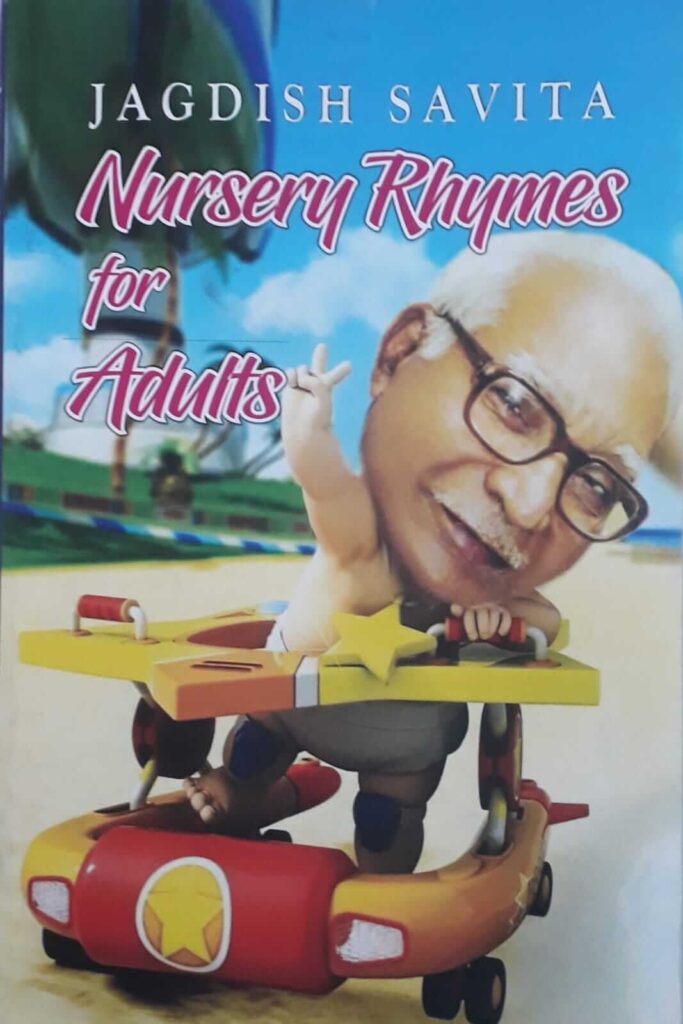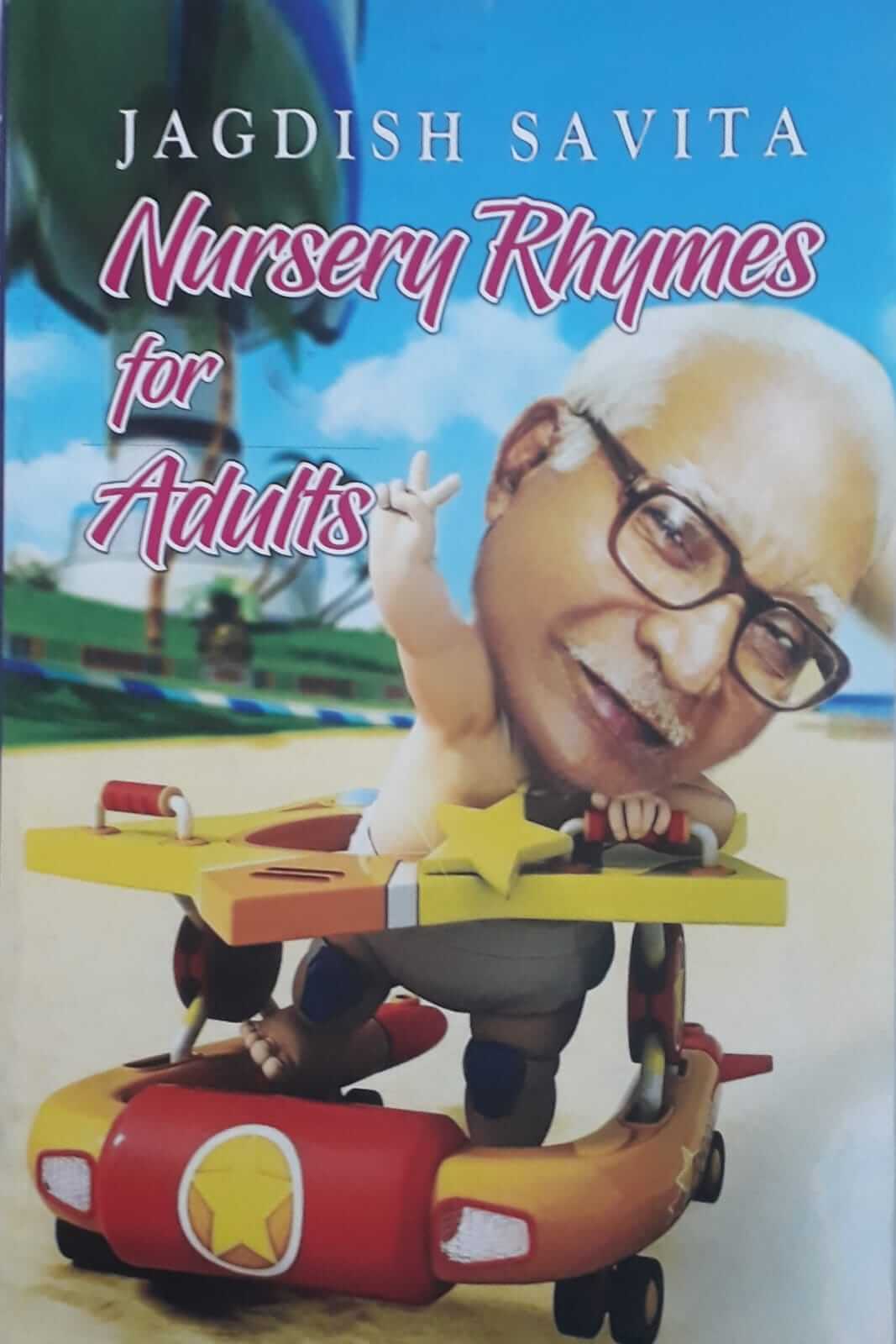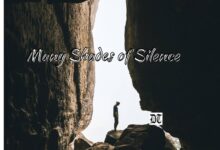Abu reviews Prof Jagdish Savita’s debut English collection of poetry, Nursery Rhymes for Adults – exclusively for Different Truths.

Professor Jagdish Savita, born in 1934, at Deoband, in UP, is a bilingual poet. He writes both in Hindi and English. “Poetry is a vitamin for him”, and he has been composing it for over half a century. His first collection of Hindi poems was published at the age of 76. He has so far published six collections of Hindi poems. Nursery Rhymes for Adults is the octogenarian poet’s debut English collection of poetry, and it is dedicated to his “childish self”.
Nursery Rhymes for Adults has 515 short poems. Each poem consists of eight lines, divided into two quatrains.
Nursery Rhymes for Adults has 515 short poems. Each poem consists of eight lines, divided into two quatrains. The collection begins with no. 001 “Apologia”, dated 22 December 2016 and ends with no. 515 “Epilogue”, dated 3 December 2015. Barring these two said poems, the rest of 513 poems beginning with “Credo”, penned on 21st January 1973 and ending with “Survivors”, written on 11th June 2020, are chronologically put. So the book records the poet’s thoughts, passions, emotions, and reactions to diverse incidents of forty-seven and half years of his “childish” self.
About the book, the poet Savita wrote, “These are not modern or post-modern poetry. There is nothing deep-brow and high-brow about them. They are what they are—Nursery Rhymes for God’s chillum past their teens! Call them my hobby horse. I have been singing and dancing with them for over half a century now.”
Let’s delve into some of his amusingly profound verses.
What is man but God’s own robot To carry out His will? … some unseen finger moves …we cry, we laugh, we love, we fight Until we are scrap!” ( “God’s Robot”)
Here the poet is a fatalist. This fatalistic thought has a huge appeal to enlightened and individualistic Indians.
The verse echoes King Lear’s famous lines: “As flies to wanton boys are we to the gods; they kill us for their sport.” Here the poet is a fatalist. This fatalistic thought greatly appeals to the enlightened and individualistic Indians, the collective Indian working class and the poor peasantry. Before the slightest obstacles like ill health or monetary exigency, they, irrespective of class, caste, gender, and other affinities, ask gods, Allah, for their safe sail to the shore. It is the safest route for the Indians to be assuaged from the pains of penury and illness, other personal tragedies, and even natural calamities like earthquakes, floods or droughts.
The poet is too much in the world.
The poet is too much in the world. A poem titled “New World” (p 183) reads:

Doomed to inhale polluted air ‘n stand the millennial shock Tainted is our daily bread Roads are chock-a-block Countryside is fancy-dressing Kids are extra smart Technology is a mischief monger Dying, too, is an art.
Look at the sense of irony entrenched in the lines. Pollution and traffic jams are real problems in Indian cities. And the villages are rapidly getting transformed by the touch of globalisation. His mocking of the university education system is too apparent in “Varsity Dons” (p 164):
Ancient Aryans were beef eaters Buddha tasted pork The Bard of Avon was a stoner Gandhi skipped New York …this they call research When in the woods, they cannot tell A beech hedge from a birch On death, he caustically writes: Want to perish moolah obese? Or just power drunk Or of gout or arthritis Or rust away as junk Then he changes his tone and philosophically advises: Die you must and back to dust You aren’t here for long Why not die of dreams, sweet dreams? Why not die of the song? (“Death Wish” p. 129)
The range of topics included in Nursery Rhymes for Adults is almost encyclopedic
The range of topics included in Nursery Rhymes for Adults is almost encyclopedic: from a desire to die, from personal grief to general human tragedy, from nature to nurture, from irony to philosophy, from caricature to intellectual integrity, from love to loveless, from the daily scenes of bazaars to the lands of dreams. The poet is a mature guy who, like Tennyson’s Ulysses, has seen and known much of the world. He has borne trials and tribulations, pains and rewards like a sage. But he finds no reason to conceal the dark sides of things in the world. The poet is not romantic or idealistic. He is a man of substance, deeply rooted in the soil. He has the power to withstand the hazards of life with a sense of equanimity.
The poet calmly acknowledges towards the end of his work:
My liaison with human mortal ‘n Nature’s varied gifts With the skyey kaleidoscopic With spiritual steps and lifts It’s all right, but o my Master Where’s that touted bliss? (“Unfulfilled” p. 189)
Thoughts are contained within this limited space. It has given a kind of uniformity to the lyrics.
Structurally the poems are composed of two quartets. Thoughts are contained within this limited space. It has given a kind of uniformity to the lyrics. But it has also marred the free flow of the poet’s thoughts. His allegiance to the neat structure of eight lines makes the poems too stiff. Readers must always be cautious to grasp his words’ meaning. There is little space for leisurely reading and enjoying the same.
I have strongly felt Francis Bacon’s witty presence in many poems. Intellectually, sarcastically, wittily, and ironically the poet has tirelessly recorded the resources of his fertile mind, the doings and un-doings of his childlike self.
Enjoy reading Nursery Rhymes for Adults!
Cover photo sourced by the reviewer





 By
By
 By
By
 By
By
 By
By
Abu Siddik is a poet, short story writer and literary critic. He ,in fact is a genius at work. He has reviewed several literary books. His review is meticulous and impartial. He goes thoroughly and absorb the content and then express his opinion candidly. His candid say is always encouraging and laced with his sincerity. The present review is so beautiful. His comment shows his keen interest in literature.